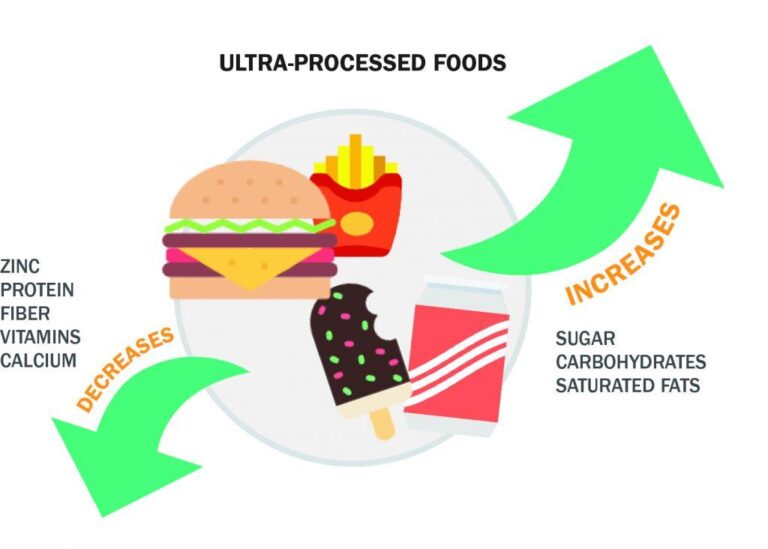When it comes to making healthier choices, understanding what’s really inside your food is key.Processed foods are everywhere — from the snacks you grab on the go to the convenient meals in your freezer. But how do these foods impact your nutrition and overall health? In this article, we’ll break down what processed foods actually are, explore how they can affect your body, and share simple tips to help you make smarter, more nourishing choices without feeling overwhelmed. Let’s get into the nitty-gritty of processed foods so you can eat well and feel great!
Table of Contents
- the Hidden Nutrients Lost in Processing
- The Impact of Additives and Preservatives on Your Health
- How Processed Foods Influence Your Energy and Weight
- smart Swaps for a Healthier Diet Without Sacrificing Convenience
- To Conclude
The Hidden Nutrients Lost in Processing
When food undergoes heavy processing,many of its essential nutrients quietly disappear in the shadows. Vitamins like B-complex, vitamin C, and natural antioxidants are often stripped away during refining, exposing your body to nutrient gaps it didn’t have before. The high heat, chemical additives, and removal of fiber-rich components in processed foods reduce their nutritional value, leaving you with calories but far fewer benefits. This erosion not only affects how your body functions daily but can also weaken your immune system and impair long-term health.
Its not just about the vitamins either. Many processed products lose vital minerals and beneficial phytonutrients that work synergistically with other compounds to maintain energy, brain function, and even mood balance. Here’s what frequently enough gets lost:
- Magnesium: Crucial for muscle and nerve health.
- Potassium: Helps regulate blood pressure and fluid balance.
- Fiber: Essential for digestion and overall gut health.
- Phytonutrients: Plant compounds that combat inflammation and oxidative stress.
By consistently opting for processed options, you’re missing out on the natural harmony of nutrients your whole body craves for optimal wellness.
The Impact of Additives and preservatives on Your Health
When you look at the ingredient list on processed foods, additives and preservatives often jump out as unfamiliar, chemical-sounding names. These substances are introduced to prolong shelf life, enhance flavor, and improve texture—but they don’t come without consequences. Frequent consumption of certain additives like artificial sweeteners, colorants, and flavor enhancers can interfere with digestion, trigger allergic reactions, or even contribute to long-term health conditions. As an example, some preservatives have been linked to digestive discomfort and may disrupt the natural balance of gut bacteria, a key player in overall health and immunity.
Your body is better off knowing what it’s consuming. Here are a few common additives to be wary of:
- Monosodium glutamate (MSG): Frequently enough used to boost flavor, it can cause headaches and sensitivity in some people.
- Sodium nitrites: Found in processed meats and linked to increased risks of certain cancers.
- Artificial sweeteners: Although calorie-free, they may alter metabolism and impact gut health.
- High fructose corn syrup: A sweetener that can contribute to obesity and insulin resistance.
Being mindful and reading labels empowers you to make choices that favor your well-being,keeping your nutrition clean,balanced,and truly nourishing.
How Processed Foods Influence Your Energy and Weight
When you consume processed foods, your body experiences a rapid energy spike followed by a sharp crash. These foods are often high in refined sugars and unhealthy fats, which can disrupt your natural energy balance. Instead of a slow, steady release of fuel, you get swift bursts that leave you feeling drained shortly after eating. Over time, this rollercoaster effect can contribute to persistent fatigue and reduced motivation, making it harder to stay active and maintain a healthy lifestyle.
Along with fluctuating energy levels,processed foods typically contain empty calories that provide little nutritional value but pack on excess weight. Key factors include:
- High sodium content,leading to water retention and bloating
- Added sugars that promote fat storage,especially around the abdomen
- Lack of fiber,which disrupts digestion and satiety signals
by limiting processed food intake and choosing whole,nutrient-dense options,you support sustained energy and a healthier body composition.
Smart Swaps for a Healthier Diet Without Sacrificing convenience
When it comes to making smarter food choices,you don’t have to give up the ease and speed that processed foods offer.Simple swaps like replacing sugary breakfast cereals with overnight oats topped with fresh fruit can keep your mornings nutritious and hassle-free. Opting for whole grain wraps instead of white bread for a quick sandwich not only adds fiber but also provides lasting energy throughout the day. Plus, keeping handy snack options like unsalted nuts or pre-cut veggies allows you to dodge common processed snack pitfalls without slowing down your busy lifestyle.
- choose natural nut butters over those loaded with sugar and hydrogenated oils.
- Swap soda or sugary drinks for sparkling water with a splash of lemon or lime.
- replace instant noodles with whole grain pasta or quick-cook quinoa paired with steamed veggies.
- Find frozen fruits and veggies without added sauces or salt as a quick and healthy option.
- Use Greek yogurt in place of sour cream for dips or dressings to boost protein and cut calories.
To Conclude
Thanks for sticking with me through this deep dive into processed foods and their impact on your nutrition! While they can be convenient and tasty, it’s helpful to stay mindful about how frequently enough and what types you’re reaching for. Remember, focusing on whole, nutrient-rich foods alongside occasional treats can help you feel your best without feeling deprived. So next time you’re at the grocery store or grabbing a quick bite, you’ll have a little extra knowledge to make choices that truly nourish your body. here’s to enjoying food—and feeling good doing it!

